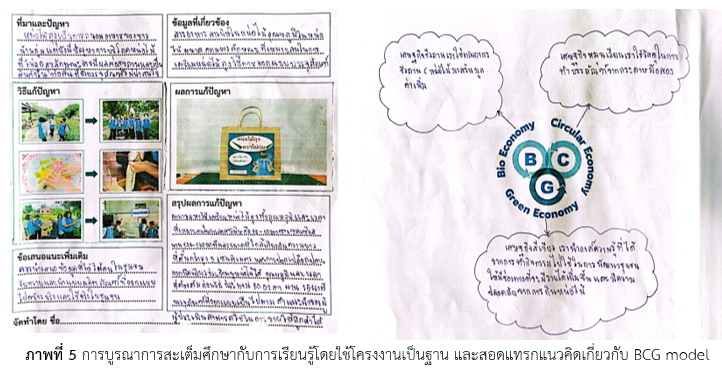ผลการจัดการเรียนรู้แบบโครงงาน STEM BCG เพื่อแก้ไขปัญหาในท้องถิ่นของนักเรียนชั้นประถมศึกษาปีที่ 6 ที่มีต่อผลสัมฤทธิ์ทางการเรียนและความสามารถในการแก้ปัญหาวิชาวิทยาศาสตร์และเทคโนโลยี
Main Article Content
บทคัดย่อ
STEM สามารถทำให้นักเรียนเกิดการเรียนรู้และบูรณาการความรู้ทางวิทยาศาสตร์มาแก้ไขปัญหาได้ ส่วน BCG Model เป็นการพัฒนาเศรษฐกิจแบบองค์รวมที่ไม่ได้พัฒนาแค่เศรษฐกิจเท่านั้น แต่พัฒนาสังคม และส่งเสริมการรักษาสิ่งแวดล้อมให้สมดุล มั่นคง และยั่งยืนด้วย ซึ่งทั้งสองอย่างนี้มีความสำคัญที่จะนำมาบูรณาการให้นักเรียนได้เรียนรู้กระบวนการจนสามารถพัฒนาความรู้ และความสามารถได้ ดังนั้นผู้วิจัยจึงมีแนวคิดที่จะศึกษาผลการจัดการเรียนรู้แบบโครงงาน STEM BCG โดยศึกษาความสามารถในการแก้ปัญหา และผลสัมฤทธิ์ทางการเรียนวิชาวิทยาศาสตร์และเทคโนโลยี กลุ่มเป้าหมายเป็นนักเรียนชั้นประถมศึกษาปีที่ 6 ปีการศึกษา 2565 โรงเรียนบ้านกุ่ม สำนักงานเขตพื้นที่การศึกษาประถมศึกษาอุบลราชธานี เขต 3 จำนวน 17 คน เครื่องมือที่ใช้ในการวิจัย ได้แก่ คู่มือการแก้ไขปัญหาในท้องถิ่นตามขั้นตอนโครงงานสะเต็มศึกษา ร่วมกับ BCG model แบบทดสอบวัดผลสัมฤทธิ์ทางการเรียน และแบบทดสอบวัดความสามารถในการแก้ปัญหา สถิติที่ใช้ในการวิจัย ได้แก่ ค่าร้อยละ ค่าเฉลี่ย ส่วนเบี่ยงเบนมาตรฐาน คะแนนพัฒนาการสัมพัทธ์ และการทดสอบทีแบบสองกลุ่มที่ไม่เป็นอิสระต่อกัน ผลการวิจัย พบว่า 1) นักเรียนมีผลสัมฤทธิ์ทางการเรียนวิชาวิทยาศาสตร์และเทคโนโลยี และความสามารถในการแก้ปัญหา หลังเรียนสูงกว่าก่อนเรียนอย่างมีนัยสําคัญทางสถิติระดับ .01 และ 2) จากการประเมินพัฒนาการทางการเรียนและความสามารถในการแก้ปัญหาของนักเรียนด้วยคะแนนพัฒนาการสัมพัทธ์ พบว่า นักเรียนมีระดับพัฒนาการทางการเรียนร้อยละ 41.00 อยู่ในระดับกลาง ร้อยละ 47.00 อยู่ในระดับสูง และร้อยละ 12.00 อยู่ในระดับสูงมาก และมีระดับพัฒนาการความสามารถในการแก้ปัญหา ร้อยละ 6.00 อยู่ในระดับต้น ร้อยละ 41.00 อยู่ในระดับกลาง และร้อยละ 53.00 อยู่ในระดับสูง
Article Details

อนุญาตภายใต้เงื่อนไข Creative Commons Attribution-NonCommercial-NoDerivatives 4.0 International License.
วารสารวิทยาศาสตร์และวิทยาศาสตร์ศึกษา (JSSE) เป็นผู้ถือลิสิทธิ์บทความทุกบทความที่เผยแพร่ใน JSSE นี้ ทั้งนี้ ผู้เขียนจะต้องส่งแบบโอนลิขสิทธิ์บทความฉบับที่มีรายมือชื่อของผู้เขียนหลักหรือผู้ที่ได้รับมอบอำนาจแทนผู้เขียนทุกนให้กับ JSSE ก่อนที่บทความจะมีการเผยแพร่ผ่านเว็บไซต์ของวารสาร
แบบโอนลิขสิทธิ์บทความ (Copyright Transfer Form)
ทางวารสาร JSSE ได้กำหนดให้มีการกรอกแบบโอนลิขสิทธิ์บทความให้ครบถ้วนและส่งมายังกองบรรณาธิการในข้อมูลเสริม (supplementary data) พร้อมกับนิพนธ์ต้นฉบับ (manuscript) ที่ส่งมาขอรับการตีพิมพ์ ทั้งนี้ ผู้เขียนหลัก (corresponding authors) หรือผู้รับมอบอำนาจ (ในฐานะตัวแทนของผู้เขียนทุกคน) สามารถดำเนินการโอนลิขสิทธิ์บทความแทนผู้เขียนทั้งหมดได้ ซึ่งสามารถอัพโหลดไฟล์บทความต้นฉบับ (Manuscript) และไฟล์แบบโอนลิขสิทธิ์บทความ (Copyright Transfer Form) ในเมนู “Upload Submission” ดังนี้
1. อัพโหลดไฟล์บทความต้นฉบับ (Manuscript) ในเมนูย่อย Article Component > Article Text
2. อัพโหลดไฟล์แบบโอนลิขสิทธิ์บทความ (Copyright Transfer Form) ในเมนูย่อย Article Component > Other
ดาวน์โหลด ไฟล์แบบโอนลิขสิทธิ์บทความ (Copyright Transfer Form)
เอกสารอ้างอิง
Chattiang, T., Nualkaekul, S., Kerdpiboon., S., and Ingkasupart, P. (2021). Characteristics of Dried Bamboo Shoot Stick and Its Rehydration (in Thai). Thai Science and Technology Journal, 29(5), 850-864.
Faikhamta, C. (2022). STEM activities to build core competencies for youth and the design of STEM activities that correspond to six core competencies (in Thai). Retrieved 2 September 2022, from NSTDA: https://www.nstda.or.th/nac/2022/youth-activity/b1-30f-09y/
Funfuengfu, V. (2017). STEM Education and Thailand Education (in Thai). Valaya Alongkorn Review (Humanities and Social Science), 7(2), 13-23.
Jansuwan, K., Sirithanyarat, C., and Saengloetuthai, J. (2020). Development of science learning achievement and ability to solving problems of grade 7 students using problem-based learning with STEM education (in Thai). Journal for social sciences research, 11(1), 1-11.
Jongsarit, R. (2022). Linking future education with BCG model (in Thai). Retrieved 2 September 2022, from NSTDA: https://www.nstda.or.th/nac/2022/youth-activity/b1-30f-09y/
Kaewbuadee, A., Sirithanyarat, J., and Niyomsub, N. (2019). Development of learning achievement and creative problem-solving ability of fifth grade students using scientific learning management based on STEM education (in Thai). Journal for social sciences research, 10(2), 130-148.
Kanjanawasee, S. (2014). Gain Scores (in Thai). Research Journal the Social Science Research Association of Thailand, 1(1), 12-13.
Khongsook, S., Thumthong, B., and Pradabsri, P. (2019). The development of stem education activities to promote problem solv-ing ability and learning inquiry behavior for Matthayomsuksa three students kapchoengwittaya school (in Thai). Journal of Education, Silpakorn University, 16(2), 201-212.
Klomim, K. (2016). Learning management Based on STEM Education for Student Teachers (in Thai). Journal of Education Naresuan University, 18(4), 334-348.
Kuaklung, K., Kessaratikoon, P., and Prasitpong, S. (2018). The Study of Archivement by STEM Education on Equilibrium and Elasticity for Grade 11 Students (in Thai). Journal of Education Thaksin University, 18(2), 124-135.
Ladachart, L. and Ladachart, L. (2022). STEM identity: Another factor that will promote achievement of STEM education in Thailand (in Thai). Journal of Science and Science Education, 5(1), 148-157.
National Science and Technology Development Agency (NSTDA). (2022). Workshop on STEM Activities to Promote Student Competency with BCG Model (in Thai). Retrieved 2 September 2022, from NSTDA: https://www.nstda.or.th/nac/2022/youth-activity/b1-30f-09y/
National Science and Technology Development Agency (NSTDA). (2022). BCG Model (in Thai). Retrieved 2 September 2022, from BCG: https://www.bcg.in.th/background/
National STEM Education Center. (2015). STEM Network [Manual] (in Thai). Bangkok: The institute for the Promotion of Teaching Science and Technology.
Nilalad, S. (2019). A Development of Problem -Solving Skill of Mathayomsuksa 4 Students at Muangbuawittaya School by Using Integrated STEM Learning Unit Emphasizing Engineering Design Process (in Thai). Master’s Thesis. Buriram: Buriram Rajabhat University.
Polyiem, T. (2018). STEM Education: Introduction to Integrated Classroom (in Thai). Journal of Faculty of Education Pibulsongkram Rajabhat University, 5(2), 122-135.
Ruamcharoen, J., Kerdthip, K., and Jeerasathian, P. (2021). STEM Education for Lifelong Learning: Case Study to Raise the Creative Products Level from Banana Leaf to Drive the Community Economy (in Thai). Journal of Education and Innovative Learning, 1(2), 187-206.
Ruengrung, S., Sukmas, T., and Kaewtubtim, P. (2023). The effect of SATIT PSU STEM INNOVATION as Project-Based Learning in the design and development of an experimental set approach by grade 10th students on Problem-Solving Skills and Physics’ Learning Achievement (in Thai). Journal of Education Naresuan University, 25(3), inpress.
Singto, A. (2019). The development of STEM Education learning activities to enhance problem-solving thinking ability for mathayomsuksa 1 (in Thai). Journal of MCU Nakhondhat, 7(7), 387-398.
Srichantha, S., Roongsattham, P., and Wichai, P. (2019). STEM Education with Learning Management (in Thai). Prae-wa Kalasin Journal of Kalasin University, 6(1), 157-178.
Srisa-Ard, B. (2013). Basic Research (in Thai). Bangkok: Suweeriyasan.
Suwannawong, K., Soparat, S. and Thiamtham, T. (2020). The Enhancement of Thinking Process focusing on Problem Solving by Using STEM Education Projects for Mathayomsuksa 6 Students of Horwang Pathumthani School (in Thai). Journal of Nakhon Ratchasima College, 11(1), 1-11.
Visetsuvarnabhumi, K. (2019). SATIT PSU STEM INNOVATION project-based learning [Handout]. (in Thai). Pattani: Faculty of Education Prince of Songkla University.
Weir, J. J. (1974). Problem Solving is Every body’s Problem. The Science Teacher, 4(1), 16–18.
Wongchachom, P. and Cojorn, K. (2016). A Development of CreativeThinkingand Learning Achievement of Matthayomsueksa 5 Students based on the STEM Education Cooperated with Project-based Learning (in Thai). Journal of Education, Mahasarakham University, 10 (Special Edition), 465-474.


